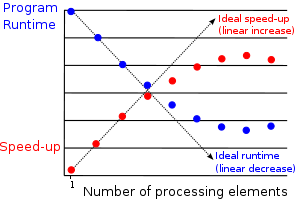
Parallel slowdown
Encyclopedia

Parallel computing
Parallel computing is a form of computation in which many calculations are carried out simultaneously, operating on the principle that large problems can often be divided into smaller ones, which are then solved concurrently . There are several different forms of parallel computing: bit-level,...
where parallelization of a parallel computer program
Parallel algorithm
In computer science, a parallel algorithm or concurrent algorithm, as opposed to a traditional sequential algorithm, is an algorithm which can be executed a piece at a time on many different processing devices, and then put back together again at the end to get the correct result.Some algorithms...
beyond a certain point causes the program to run slower (take more time to run to completion).
Parallel slowdown is typically the result of a communications bottleneck. As more processing nodes are added, each processing node spends progressively more time doing communication than useful processing. At some point, the communications overhead created by adding another processing node surpasses the increased processing power that node provides, and parallel slowdown occurs.

